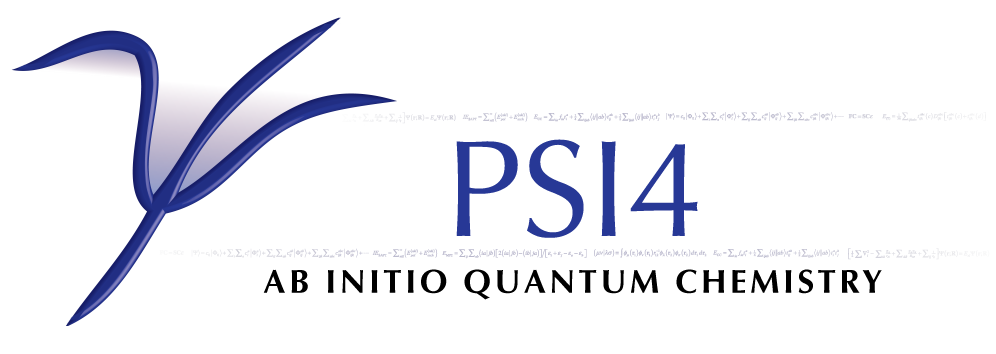
CCENERGY¶
Computes coupled cluster energies. Called as part of any coupled cluster computation.
General¶
BRUECKNER_ORBS_R_CONVERGENCE¶
Convergence criterion for Breuckner orbitals. The convergence is determined based on the largest
amplitude.
- Type: conv double
- Default: 1e-5
CACHELEVEL¶
Cacheing level for libdpd governing the storage of amplitudes, integrals, and intermediates in the CC procedure. A value of 0 retains no quantities in cache, while a level of 6 attempts to store all quantities in cache. For particularly large calculations, a value of 0 may help with certain types of memory problems. The default is 2, which means that all four-index quantites with up to two virtual-orbital indices (e.g.,
integrals) may be held in the cache.
- Type: integer
- Default: 2
CACHETYPE¶
Selects the priority type for maintaining the automatic memory cache used by the libdpd codes. A value of LOW selects a “low priority” scheme in which the deletion of items from the cache is based on pre-programmed priorities. A value of LRU selects a “least recently used” scheme in which the oldest item in the cache will be the first one deleted.
- Type: string
- Possible Values: LOW, LRU
- Default: LOW
CC_NUM_THREADS¶
Number of threads
- Type: integer
- Default: 1
CC_OS_SCALE¶
Coupled-cluster opposite-spin scaling value
- Type: double
- Default: 1.27
CC_SS_SCALE¶
Coupled-cluster same-spin scaling value
- Type: double
- Default: 1.13
LOCAL_CPHF_CUTOFF¶
Cutoff value for local-coupled-perturbed-Hartree-Fock
- Type: double
- Default: 0.10
LOCAL_CUTOFF¶
Value (always between one and zero) for the Broughton-Pulay completeness check used to contruct orbital domains for local-CC calculations. See J. Broughton and P. Pulay, J. Comp. Chem. 14, 736-740 (1993) and C. Hampel and H.-J. Werner, J. Chem. Phys. 104, 6286-6297 (1996).
- Type: double
- Default: 0.02
LOCAL_METHOD¶
Type of local-CCSD scheme to be simulated. WERNER selects the method developed by H.-J. Werner and co-workers, and AOBASIS selects the method developed by G.E. Scuseria and co-workers (currently inoperative).
- Type: string
- Possible Values: WERNER, AOBASIS
- Default: WERNER
LOCAL_PAIRDEF¶
Definition of local pair domains, default is BP, Boughton-Pulay.
- Type: string
- Possible Values: BP, RESPONSE
- Default: BP
LOCAL_WEAKP¶
Desired treatment of “weak pairs” in the local-CCSD method. A value of NEGLECT ignores weak pairs entirely. A value of NONE treats weak pairs in the same manner as strong pairs. A value of MP2 uses second-order perturbation theory to correct the local-CCSD energy computed with weak pairs ignored.
- Type: string
- Possible Values: NONE, NEGLECT, MP2
- Default: NONE
MP2_AMPS_PRINT¶
Do print the MP2 amplitudes which are the starting guesses for RHF and UHF reference functions?
- Type: boolean
- Default: false
MP2_OS_SCALE¶
MP2 opposite-spin scaling value
- Type: double
- Default: 1.20
MP2_SS_SCALE¶
MP2 same-spin scaling value
- Type: double
- Default: 1.0/3.0
NEW_TRIPLES¶
Do use new triples?
- Type: boolean
- Default: true
NUM_AMPS_PRINT¶
Number of important
and
amplitudes to print
- Type: integer
- Default: 10
PAIR_ENERGIES_PRINT¶
Do print MP2 and CCSD pair energies for RHF references?
- Type: boolean
- Default: false
PROPERTY¶
The response property desired. Acceptable values are POLARIZABILITY (default) for dipole-polarizabilities, ROTATION for specific rotations, ROA for Raman Optical Activity, and ALL for all of the above.
- Type: string
- Possible Values: POLARIZABILITY, ROTATION, MAGNETIZABILITY, ROA, ALL
- Default: POLARIZABILITY
RESTART¶
Do restart the coupled-cluster iterations from old
and
amplitudes? For geometry optimizations, Brueckner calculations, etc. the iterative solution of the CC amplitude equations may benefit considerably by reusing old vectors as initial guesses. Assuming that the MO phases remain the same between updates, the CC codes will, by default, re-use old vectors, unless the user sets RESTART = false.
- Type: boolean
- Default: true
R_CONVERGENCE¶
Convergence criterion for wavefunction (change) in CC amplitude equations.
- Type: conv double
- Default: 1e-7
SEMICANONICAL¶
Convert ROHF MOs to semicanonical MOs
- Type: boolean
- Default: true
SPINADAPT_ENERGIES¶
Do print spin-adapted pair energies?
- Type: boolean
- Default: false
T2_COUPLED¶
- Type: boolean
- Default: false
T3_WS_INCORE¶
Do build W intermediates required for cc3 in core memory?
- Type: boolean
- Default: false
Expert¶
AO_BASIS¶
The algorithm to use for the
terms If AO_BASIS is NONE, the MO-basis integrals will be used; if AO_BASIS is DISK, the AO-basis integrals stored on disk will be used; if AO_BASIS is DIRECT, the AO-basis integrals will be computed on the fly as necessary. NB: The DIRECT option is not fully implemented and should only be used by experts. Default is NONE. Note: The developers recommend use of this keyword only as a last resort because it significantly slows the calculation. The current algorithms for handling the MO-basis four-virtual-index integrals have been significantly improved and are preferable to the AO-based approach.
- Type: string
- Possible Values: NONE, DISK, DIRECT
- Default: NONE
FORCE_RESTART¶
Do restart the coupled-cluster iterations even if MO phases are screwed up?
- Type: boolean
- Default: false